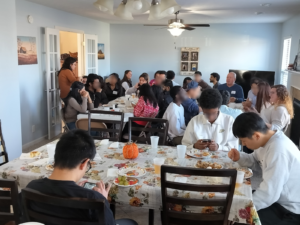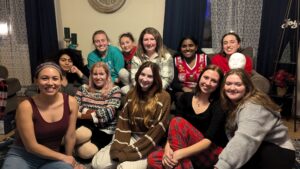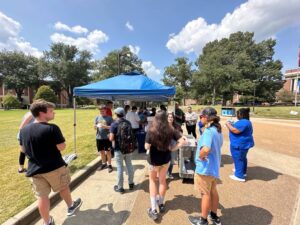For eight years, every Friday night during the academic year our ministry hosted students for a free meal and a chance to practice English, make friends, and talk about topics that allowed us to share our worldviews. We played music, learned about different cultures, looked forward to seeing old friends and making new ones. We shared the Gospel with students who had never been to church, or in some instances, had never met a Christian.
Though I didn’t think of the term “Third Place,” every criteria mentioned by sociologist Ray Oldenburg was included in our ethos: free or inexpensive, food and drink important factors, highly accessible, welcoming and comfortable, involved regulars, and old and new friends could be found there.
In a recent post on the Collegiate Collective about Third Places and campus ministry, Ben Pontius described what is a Third Place and why these spaces are needed. His article got me thinking about Third Place and international students, and how to help people create, or in many instances, take advantage of preexisting Third Places.
For many international students there is not a natural draw to attend church or check out a campus ministry listed as a “club” or RSO. So, we tried to create a neutral place or “spot” where we could integrate Christians with non-Christians.
In those days we used the fellowship hall of a local church to create a cafe style meal and conversation time with our international students. We had great help by American students and church members, but also met many Christians who could not grasp an incarnational ministry that did not focus on getting people to church to “hear the preacher” rather than being missionaries themselves. One of the biggest problems, of course, was that students could not understand the preacher. Nor did they want to get up early on a Sunday.
Other ministry leaders wanted us to bring international students into the local Christian college ministry. Here the problem for many of the visiting international students was no connection to Christian campus culture. They were excited to be hanging out with other students, but just could not follow what was going on. There were just too many cultural divides (depending on where they were coming from of course).
So utilizing neutral spaces for international students is crucial. And it does not have to be as elaborate as a meal with programing and all the planning that goes with it. The key theme is an outwardly focused, incarnational mindset that sees the Third Place as a connecting point. The Third Place is a gateway to more conversations for certain, but it is, in and of itself, a valid use of time and resources for Kingdom purposes.
So, what are some Third Places for international students on the campus?
First of all, one of the great things about doing ministry on a campus is that the campus is a melange of all three places: it is work, home, and neutral space to many students. The library, the quad, the gym, and the “study lounge” in dorms all have a feeling of being certain degrees of neutral. Look around at the space on campus and be creative in using it.
Second, the great thing about working with and through the university International Student and Scholar Office (ISSO) is that you do not need to reinvent and administer programs that already exist. Many of these programs are designed to match people together. Some programs are even open to non-students as well. Make use of them!
Examples of Officially Sanctioned University Events
- English Conversation/Cultural Exchange Programs on Campus.
Many colleges have programs that match an American student with an international student to learn about cultural differences and perhaps practice English. Most ISSO offices are looking for more American students to join than international. Cast vision for your students to be learners, listeners, and friends through this program. It’s up to the participants to find the place, but the program has put the people together. It won’t be hard for students to find a Third Space while having coffee and talking.
- Host Family Programs that Church Members Can Join.
Just like they are often looking for American students to be cultural partners with international students, many ISSO offices are looking for non-student families and singles to be host or “friendship families” with students. Sometimes the ISSO will need a home for a student to stay in for a few days, but mostly these programs are to match up a student with a family to meet several times a month throughout the year. This is a great opportunity to get families involved in supporting your efforts on campus. Though having students over to a home is not technically a Third Place, I think many international students may see it as something the university offers as supplemental to their experience. Most encouragingly, the students are excited to be there. But you don’t have to start at home. You can meet on campus or take a student shopping.
- International Programs Coffee Hours on Campus.
Some ISSOs actually create the Third Place for you! Check around to see if the ISSO hosts regular coffee hours or drop-ins for students. These can be great ways to keep consistency in regular meetings and met friends of friends to keep expanding your network. If your college does not have a coffee hour, perhaps you could help get one started or offer to sponsor some of the meetings.
- Joining and Participating in an International Students Club or Language Club
Check out your college’s list of RSOs and see if there is one listed as international or language specific. This can be a great way to help American students learn about different countries, cultures, and language practice. Thinking of going to a Spanish-speaking country for a mission trip? Why not practice the language while meeting students in the Spanish club? Many of these clubs meet in classrooms around campus, so again, the university has provided the space.
I encourage you to read Ben’s article on Third Place and then look around your campus for places where you can integrate Christians with international students. Use your imagination to create wonderful Third Place for ministry while also making use of Third Place that the university has provided for you.
This is reposted from www.campusparade.com.
Tom Knight is a collegiate strategist in North Carolina, specializing in international student work. He blogs at www.campusparade.com.






